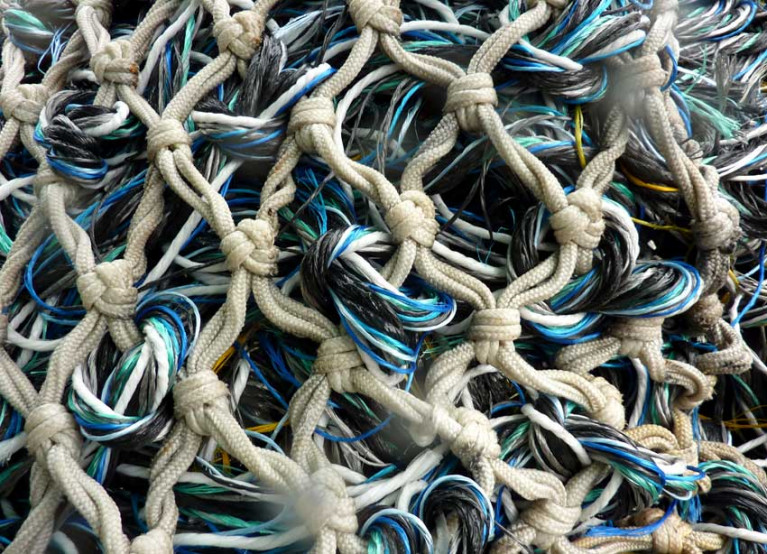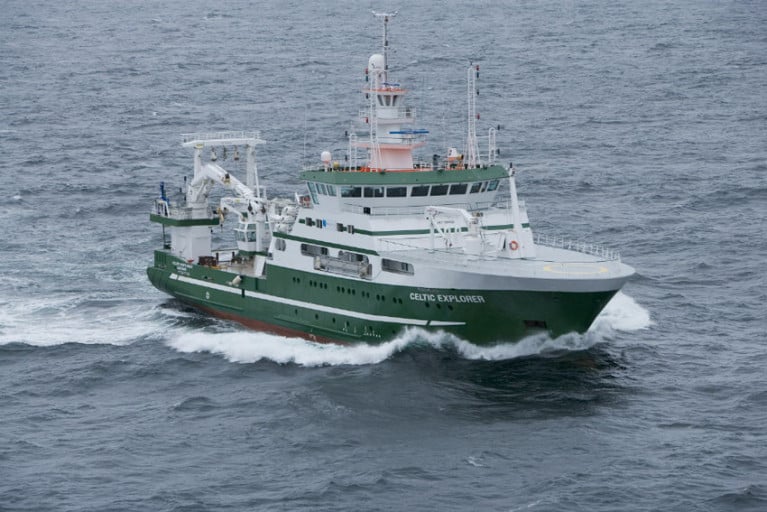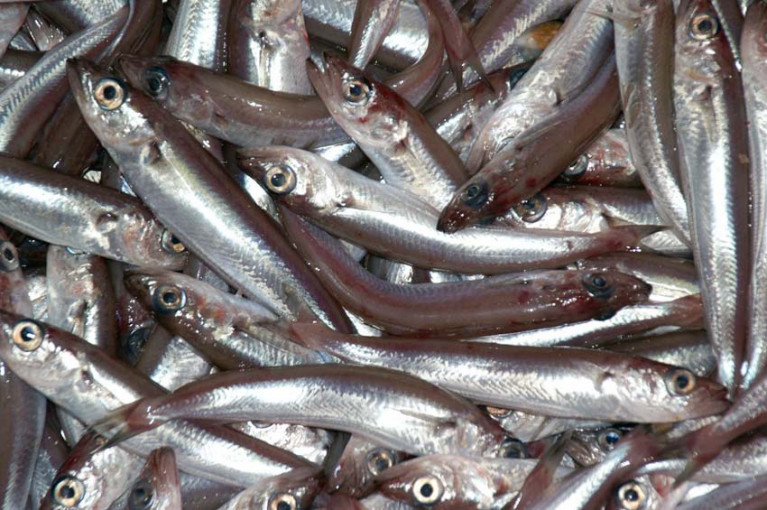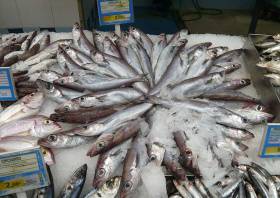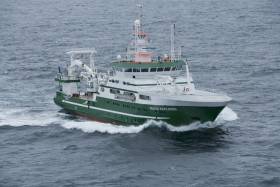Displaying items by tag: CFP
Marine Minister Presses for Protection of EU Mackerel Quotas
At the EU Agriculture and Fisheries Council in Luxembourg on Monday (26 June), Ireland’s Marine Minister highlighted the need to protect the EU’s mackerel quota in the face of external threats from third countries.
Minister Charlie McConalogue said: “At council, fisheries ministers held an initial discussion on the preparation for the negotiations on setting quotas for 2024. I set out clearly Ireland’s priorities, including the need for action to prevent the unsustainable actions of other coastal states, outside of the EU, diluting the EU’s mackerel quota share.”
Fisheries ministers also discussed the conclusions on the European Commission’s Fisheries Policy Package, which was published in February.
Minister McConalogue acknowledged the considerable progress that has been achieved to date through the framework of the Common Fisheries Policy and the key role played by stakeholders in this regard.
However, the minister also highlighted the need to take account of the significant changes over the past number of years, especially Brexit.
“The package did not, in my view, address the real and detrimental impact of Brexit on Irish fishers in particular,” he said. “Neither did it address the new reality that the majority of EU fishing opportunities are determined by annual negotiations with third parties.”
The minister added: “At my insistence, the conclusions now include a demand that the [European] Commission fully analyse and report on the impacts of quota transfers, as well as the need to develop a comprehensive strategy for relations with third countries. This demand was supported by the majority of member states.”
Marine Minister Charlie McConalogue welcomed the conclusion on Monday (20 March) of prolonged negotiations between the European Union and Norway, resulting in a bilateral fisheries agreement for 2023.
And for Ireland, the outcome is an 89 per cent increase in the blue whiting quota from 28,438 tonnes in 2022 to 53,776 tonnes in 2023.
“These are always difficult negotiations with different member states having different interests,” the minister said. “For Ireland, I am satisfied that the final outcome is the strongest possible one for our fishers. They now have a quota of 53,776 tonnes for 2023 worth in excess of €13 million.
“There were many different elements in these complex talks including reciprocal access to waters and transfers of quotas between the parties and internally in the EU.
“In that regard, I am particularly satisfied that in relation to blue whiting, Ireland was able to secure a 33% reduction in the traditional level of Norwegian access to EU waters from 68% to 45% and their complete exclusion from the blue whiting fishery in the Irish Box off the North West Coast of Ireland.”
Minster McConalogue added: “In terms of quota transfers I was able to maintain the principle that Ireland's contribution to the EU quota transfer to Norway would be capped at 4% and, as importantly, established for first time that Ireland would be directly compensated with additional quota by other member states for transfers and access provisions. In this regard I was able to secure an additional 4,820 tonnes of blue whiting for the Irish fleets.”
The minister also remarked on the latest scientific advice “that the blue whiting stock is in good shape and expanding rapidly and this, coupled with the agreement secured, bodes well for the sustainability of this fishery for Irish fishers going forward”.
Minister McConalogue concluded by thanking Irish Fishing industry representatives Aodh O’Donnell (IFPO), Sean O’Donoghue (KFO), Patrick Murphy (ISEFPO) and Brendan Byrne (IFPEA) “for the close cooperation throughout the process and their active campaigning in Europe that helped to secure this strong outcome for Irish fishers”.
Earlier in Monday’s meeting of the Agricultural and Fisheries Council in Brussels, the minster expressed concerns at proposals for a blanket ban on bottom trawling in Marine Protected Areas in the absence of an impact assessment, as previously reported on Afloat.ie.
McConalogue Trumpets Progress on Quotas at EU Fisheries Council — But Negotiations With Norway Suspended
Marine Minister Charlie McConalogue has welcomed progress made on key fish quotas for Ireland at the EU Fisheries Council of Ministers which began on Sunday morning (11 December).
The council has been agreeing provisional fish quotas to enable EU fishers to operate from the first of January.
In parallel, the Department of Agriculture, Food and the Marine says “intensive” work has continued to conclude a deal with the UK which would see full-year quotas established for 2023 on the majority of stocks of interest for Irish fishermen, which are jointly managed with the UK.
Speaking on Tuesday (13 December), Minister McConalogue said: “The EU negotiations with the UK on setting quotas for 2023 are at an advanced stage and I made use of the opportunities at the Fisheries Council to work with fellow ministers. I also continued my discussions with Commissioner Sinkevičiusto ensure that Ireland’s priorities are protected.
“My objective has been to set quotas based on scientific advice and rebuild depleted and overfished stocks. In general, I want our fishers to have access to the maximum level of quota that can be sustainably fished, whilst taking account of the complex nature of mixed fisheries.
“As the negotiations are almost complete, I am satisfied that the agreement will deliver on this objective. We have positive advice on a number of our critical commercial stocks including spurdog, nephrops, Celtic Sea monkfish, hake and megrim and northwest haddock and whiting.
“I am satisfied, following the work done over recent days that we will deliver quotas that follow the increases advised by the science. I am also supporting cuts where these are needed to reduce fishing pressure on stocks and restricted catch limits for depleted stocks.”
The Fisheries Council adopted provisional quotas for the first three months of 2023 as the EU/UK agreement is not finalised. These quotas will support fishing at the beginning of the year, the minister said: “I do not expect we will need these provisional quotas but they are an insurance policy to provide certainty for our fishers.”
Meanwhile, negotiations with Norway were suspended amid an atmosphere “negatively impacted at European level by Norway’s recent fisheries discussions with Russia”, Minister McConalogue said.
“My main issue of concern remains that [European Union] member states who benefit from an agreement with Norway pay their fair share in quota transfers.
“I am working to limit the transfer of blue whiting and keep it at no more than 4% of the blue whiting global total allowable catch (TAC). I am also working closely with Commissioner Sinkevičius to restrict access for the Norwegian fleet to the Irish zone and in particular the area within 50 miles of the Irish coast.
“I expect that negotiations will reopen soon and I am satisfied that Ireland’s key concerns are clearly understood and will be protected.”
At the EU Fisheries Council in Luxembourg today, Monday 13 June, Minister for Agriculture, Food and the Marine, Charlie McConalogue outlined Ireland’s priorities during discussions on preparation for negotiations on setting quotas for 2023.
The minister praised the efforts of all fisheries stakeholders for their ongoing contribution to delivering on the CFP’s core ambition of sustainable fisheries management.
“I noted that considerable progress has been made over the recent years in setting sustainable quotas for our important fisheries,” he said.
“I supported the commitment to delivering quotas for 2023 that build on the progress we have made. I emphasised in particular the importance of the EU addressing effectively the current unsustainable behaviour of Norway, Iceland and the Faroe Islands setting unilateral unsustainable quotas for mackerel and blue whiting.”
The minister raised again the disproportionate impacts of the EU/UK Trade and Co-operation Agreement on Ireland’s quotas.
“I made clear at Council that we need a full CFP review that takes stock of the disproportionate impacts imposed on the Irish fishing industry by Brexit and the outcome of the EU-UK Trade and Co-operation Agreement (TCA).
“If we are to continue to build on our hard-won progress, we must acknowledge and take stock of the many ways that our fisheries landscape has been totally transformed by Brexit and the TCA. This will allow us to find solutions in a spirit of solidarity within the Union to adapt and once again thrive in, our totally new post Brexit environment.”
The minister concluded by saying: “I have assured Commissioner Sinkevicius that I will continue to work closely and constructively with him and with fellow Member States on these challenges to build a sustainable future for our fishing industry.”
McConalogue Announces Common Fisheries Policy Review Group
Marine Minister Charlie McConalogue has announced the establishment of a Common Fisheries Policy Review Group to examine issues pertinent to Ireland and the fishing sector in the next review of the CFP by the European Commission, scheduled to be completed at the end of this year.
Chaired by John Malone, former Secretary General of the Department of Agriculture, the group will have a steering committee comprising Micheal O’Cinneide, former director of the Marine Institute and Environmental Protection Agency, and Mr Donal Maguire, former director in Bord Iascaigh Mhara (BIM).
The group will involve representatives of stakeholders including producer organisations, the National Inshore Fisheries Forum, the aquaculture and seafood processing industries and co-ops. It will also include representatives of environmental NGOs.
Its purpose is to examine the issues that arise for Ireland in the context of the CFP review, to advise the minister on priorities for the negotiations and to identify strategies most likely to influence the outcome of the review.
The minister will ask the group, in making its recommendations, to focus on supporting the social and economic health of Ireland’s fisheries-dependant coastal communities, economic development in the seafood sector, delivering long-term sustainability of fish stocks and maximising protection of habitats and the marine environment.
Announcing the review group today, Wednesday 9 February, Minister McConalogue said: “This forum will be able to draw on the expertise in my own department, the Marine Institute and BIM, to provide the necessary policy, scientific and technical support.
“I am very pleased that John Malone has agreed to chair this group and that he will be ably supported by Micheal O’Cinneide and Donal Maguire on the steering committee. I have asked BIM to provide the secretariat to the group and to engage Michael Keatinge, retired BIM deputy CEO and an expert in fisheries analysis, to act as rapporteur drafting the report of the group.”
The minister added: “The seafood sector has faced challenges over the recent past, arising in particular from Brexit. The work of the Seafood Task Force — Navigating Change — focused on the implications of Brexit and recommended 16 separate support schemes at a total estimated cost of €423 million.
“I am, in a structured way, progressing the implementation of those recommendations. A voluntary whitefish tie-up scheme has already been implemented, a Brexit Adjustment Scheme for the inshore fisheries sector is also operating and other schemes are being finalised.
“The Taskforce Report also identified opportunities to help address the unequal burden sharing in the EU/UK agreement, that resulted in Ireland carrying an unequal and unfair burden of EU fish quota transfers to the UK. I am actively pursuing every opportunity at EU level to address the issues.
“Now it is timely to place the focus on the EU Common Fisheries Policy and with the assistance of this review group, to prepare Ireland’s case and priorities for the upcoming EU review.”
The European Commission has launched an online questionnaire as part of its public consultation on the preparation of this report. The commission has stated its intention to close its consultation process with a stakeholder event before the summer of 2022.
The minister has asked the review group to complete its work by June to ensure that Ireland’s priorities are clearly set out and inputted into the formal commission process.
Minister McConalogue said that he is issuing invitations to the relevant stakeholder organisations for nominations to the group and expects it to get to work once all nominations are in place.
Irish Fishing Fleet Faces Quota ‘Payback’ That Will See Allowances Slashes by Thousands of Tonnes
The European Commission has put forward a “concrete and specific package of measures” to ensure Common Fisheries Policy (CFP) compliance that will see some Irish fishing fleet quotas slashed by thousands of tonnes, as The Irish Times reports.
The move announced today (Monday 15 February) follows a formal inquiry into the State’s application of CFP rules, the findings of which were delivered to Marine Minister Charlie McConalogue before Christmas.
It’s understood that overfishing of quotas for mackerel, horse mackerel and blue whiting between 2012 and 2016 will be subject to a “payback procedure” in future quotas.
And weighing of catches will now have to be done upon landing at the quayside instead of later in processing facilities, after investigators found suspected incidences of tampering with weights in a 2018 audit.
The State’s failure to implement the penalty points system for CFP infringements is also the subject of infringement proceedings by Brussels.
The Irish Times has more on the story HERE.
Irish Anglerfish & Megrim Survey 2020 Set To Begin Next Weekend
The first and second leg of 2020’s Irish Anglerfish and Megrim Survey will be carried out from next weekend off the West, South West and South Coasts of Ireland by the Marine Institute, in fulfilment of Ireland’s Common Fisheries Policy obligations.
As with previous years, IAMS 2020 — which will run from Sunday 23 February to Wednesday 18 March — is a demersal trawl survey consisting of approximately 110 otter trawls (60 minutes) in ICES areas 7b, 7c, 7g, 7h, 7j and 7k.
The survey will be conducted by the RV Celtic Explorer (Callsign: EIGB) which will be towing a Jackson demersal trawl during fishing operations and will display appropriate lights and signals.
Commercial fishing and other marine operators are requested to keep a three-nautical-mile radius area around the tow points (indicated below) clear of any gear or apparatus during the survey period outlined above.
Further details of the survey, including co-ordinates of the survey stations, are included in Marine Notice No 07 of 2020, a PDF of which is available to read or download HERE.
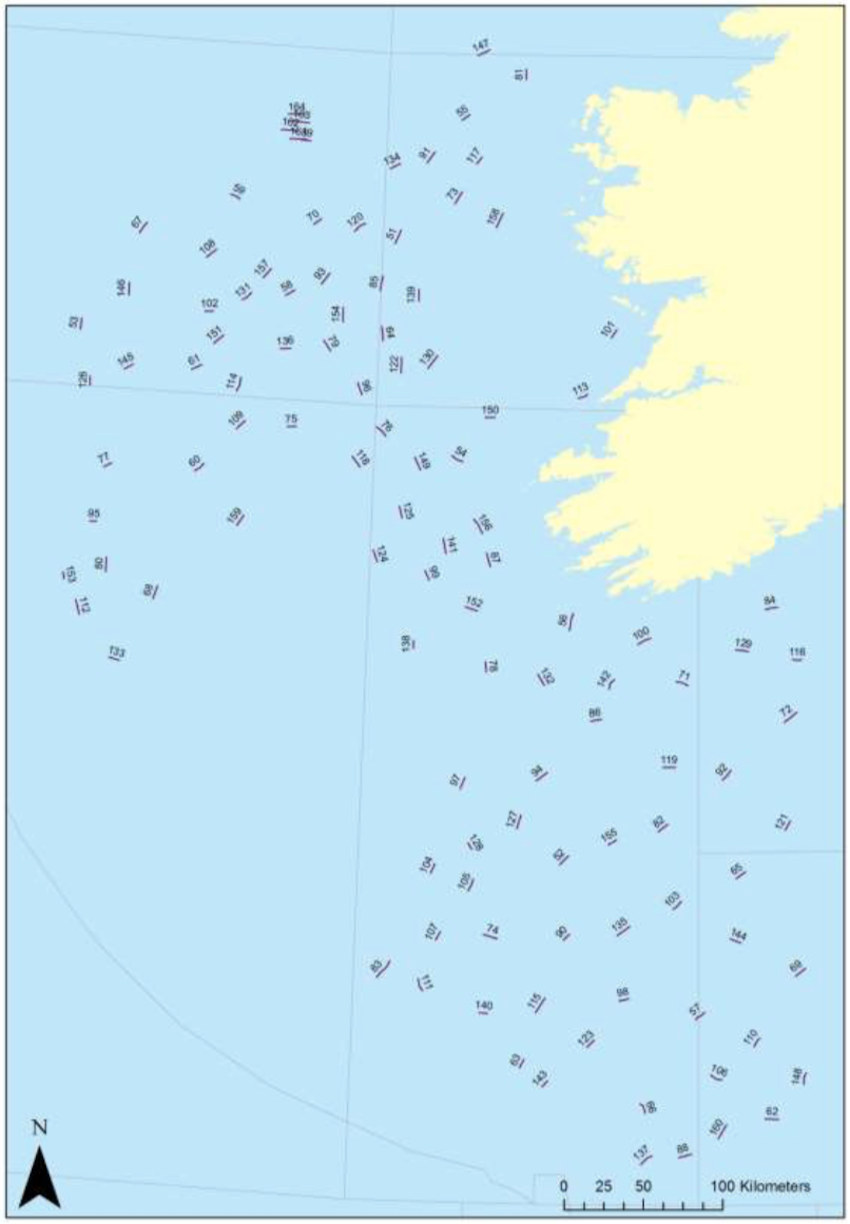
Amendments To Fisheries Bill Over New ‘Points System’ For CFP Infringements Sent For Pre-Legislative Scrutiny
The Government have authorised the Minister for Agriculture, Food and the Marine to arrange for the referral of the General Scheme of the Sea-Fisheries (Amendment) Bill 2020 to the Joint Oireachtas Committee on Agriculture, Food and the Marine for pre-legislative scrutiny prior to its submission to the Office of Parliamentary Counsel for drafting.
The main purpose of the proposed legislative amendments is to provide for a points system for masters (skippers) of fishing vessels for serious infringements of the rules of the Common Fisheries Policy, as required by EU Council Regulation 1224/2009.
The draft amending legislation would resolve some typographical errors in the Sea-fisheries and Maritime Jurisdiction Act 2006 and introduce other miscellaneous and technical amendments.
The General Scheme has been published on the Department’s website and submitted to the Joint Oireachtas Committee on Agriculture, Food and the Marine for pre-legislative scrutiny.
Marine Minister Welcomes Agreement That Brings ‘Stability’ For Ireland’s Blue Whiting Fishers
Marine Minister Michael Creed last week welcomed agreement reached between the European Union, Norway, the Faroe Islands and Iceland regarding the blue whiting fishery for 2020.
“This agreement provides welcome stability in this important fishery for Irish fishermen,” he said in London last Friday (25 October).
“There will be a small increase compared to 2019 with a quota of approximately 38,500 tonnes in 2020 for Ireland.”
The total allowable catch of 1,161,616 tonnes agreed between the parties is fully in line with the scientific advice provided by the International Council for the Exploration of the Seas (ICES).
Minister Creed added: “In these uncertain times, stability for our fisheries sector is always welcome.
“The agreement reached following the negotiations this week, in which Ireland was an active participant, will provide a quota worth approximately €11.5 million for our fishermen next year.
“This follows the international negotiations two weeks ago which agreed to a 41% increase in the mackerel quotas for 2020 in line with the scientific advice, giving Ireland a mackerel quota of over 78,000 tonnes worth over €80m directly to our catching sector for 2020.”
The minster also acknowledged the assistance provided on the Irish delegation by the Marine Institute and fishing sector representatives.
The annual Anglerfish and Megrim Survey has begun off the West South West and South Coasts of Ireland in fulfilment of Ireland’s Common Fisheries Policy obligations.
The purpose of this project is to carry out annual survey for relative annual abundance and distribution of anglerfish and megrim. However, other species of national
importance will also be sampled, along with physical and chemical oceanographic parameters.
IAMS 2019 runs till Monday 25 March. The demersal trawl survey consists of around 110 otter trawls (of 60 minutes each) in ICES areas 7b, 7c, 7g, 7h, 7j and 7k as indicated the map below.
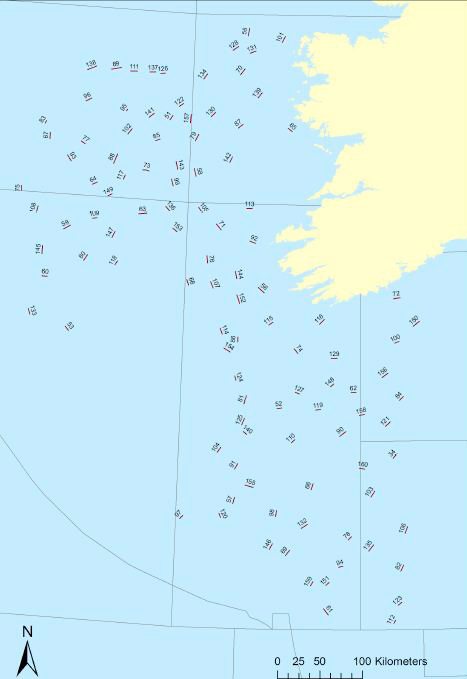
Fishing in 2019 will take place within a three-nautical-mile radius of all positions indicated.
The survey will be conducted by the RV Celtic Explorer (Callsign: EIGB). The vessel will display all appropriate lights and signals during the survey and will also be listening on VHF Channel 16. The vessel will be towing a Jackson demersal trawl during fishing operations.
Commercial fishing and other marine operators are requested to keep a 3nm area around the tow points clear of any gear or apparatus during the survey period. For more details see Marine Notice No 6 of 2019, a PDF of which is available to read or download HERE.


























